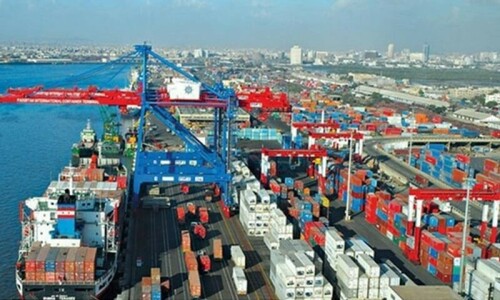
KARACHI: The country’s current account deficit during March climbed by 196 per cent month-on-month compared to February, according to latest data released by the State Bank of Pakistan (SBP) on Thursday.
The central bank reported that the current account deficit in March was at $822 million compared to $278m in February.
Cumulatively, the current account deficit has seen a gradual decrease of around 29pc during the first nine months of the fiscal year mainly due to import compression. The deficit during July-March fell by 29.4pc or $4 billion to $9.58bn against $13.589bn in the same period last year.
However, despite shrinking current account deficit, the size of trade deficit remained as large as $23.84bn. The incumbent government, despite offering multiple incentives to the export-oriented sector, during the ongoing fiscal year, has failed to improve the country’s exports. The data provided by the SBP shows that exports increased by a meagre $267m during the nine months under review.
Nine-month deficit shrinks 29pc
Moreover, the exports at the end of third quarter declined to $21.953bn against $22.22bn during the same period last year.
On the other hand, the government was successful in decreasing the country’s overall imports to $45.793bn during the first nine months of the ongoing fiscal year compared to $49.635bn during the corresponding period last year.
The SBP figures show a marked decrease in imports of both goods and services falling to $39.314bn and $6.479bn respectively.
The huge current account deficit in the last fiscal year has proven to be a challenge for the economy, and the incumbent government, after taking power shifted its entire focus to fill up the gap. The government borrowed huge sums from friendly countries and commercial banks while engaging with the International Monetary Fund for a bailout programme.
However, the government has so far failed to come up with a plan to reduce the deficit by increasing exports and is solely reliant on bilateral and multilateral borrowings to service the deficit. The government had to pay $1bn for debt servicing on April against the maturity of Eurobond launched in 2014. Another $1bn is required by end of this calendar year against the maturity of $1bn Sukuk.
Published in Dawn, April 19th, 2019












































